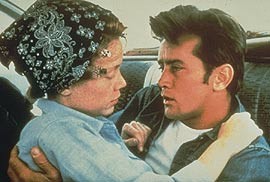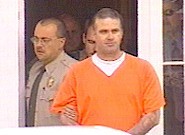
June 23, 2006
Two of the more bizarre pieces of art on exhibition at Bates College Museum of Art’s “Cryptozoology: Out of Time Place Scale” may be the drawings linked to killers who reportedly have seen Bigfoot. From San Quentin prison, I received one set of sketches and notes from the Yosemite Killer. From researcher Robert Schneck, I obtained the other, linked to a mass murderer that inspired the character played by Martin Sheen in Badlands (1972), and directly protrayed in director Bryon Werner’s Starkweather (2003). The background to these two stories is rather creepy, be forewarned, but, nevertheless, belong within the broader context of modern Bigfoot lore.
Here’s an extract from my 2003 book, Bigfoot! The True Story of Apes in America about them both:

Since Bigfoot is part of the fabric of our culture, it was only a matter of time before the dark side would venture into the Sasquatch realm. Take the case of Charles Starkweather, well known from the Martin Sheen and Sissy Spacek movie, Badlands. The true sad saga of Starkweather and his fourteen year old girlfriend Caril Ann Fugate began, in earnest, on January 21, 1958, when Starkweather killed Fugate’s mother, stepfather, and her two year old sister. Before their Nebraska-to-Wyoming murder spree was over, eleven people were dead.

In the journal Starkweather kept in prison, awaiting death in the electric chair in June 1959, he told of seeing, as a boy, a strange creature outside his Midwestern window in the mornings. He described it as a female whose hairy body “tapered off from a big chest to a small pointed head.” The visitations were accompanied by strange whistling sounds. Starkweather thought it was Death visiting him, and said of the sounds: “It was close and loud at first, but it got further and further away and the sound became mournful and sad until I couldn’t hear it no more.” Death did not make him afraid, however: “The world on the other side couldn’t be as bad as this one.”
Robert Damon Schneck’s article “Death Had a Sagittal Crest,” which appeared in the February 1999 issue of Fate magazine, points out that Starkweather’s Bigfoot sighting was, in many ways, classic. “It would be easy to ignore this story, considering the source,” Schneck writes, “if it weren’t a classic Sasquatch sighting from before the name ‘Bigfoot’ was ever applied [my emphasis]. Starkweather had no idea what he was seeing. Since he was the kind of person inclined to mass murder, he decided it must be death come to howl at his window.”
Could mass murderer Starkweather have actually seen Bigfoot? For Cary Anthony Stayner, the confessed brutal slayer of four women in Yosemite in 1999, there is no doubt. Stayner stalked the forests of Yosemite. He told of seeing a Bigfoot in the woods and being “possessed” by the hunt for these animals, a feeling that obviously reflected a wild rage within himself.
Stayner was obsessed with something else – media attention and celebrity. His brother, Steven, seven, was kidnapped on December 4, 1972. Search parties and news reports did not lead to Steven, and he remained missing for seven years. The media storm that erupted when Steven re-appeared was intense for the quiet Mormon family, especially for the father Delbert and his once-missing son, as is clearly portrayed in the 1989 made-for-TV docudrama I Know My First Name Is Steven. Steven Stayner died on September 15, 1989, when someone hit-and-run his motorcycle, shortly after the film was completed. On December 27, 1990, Cary Stayner’s uncle Jesse was found murdered in Merced, in the home he shared with Cary Stayner. The murder remains unsolved.

Then on Valentine’s Day weekend of 1999 Cary Stayner went on a killing spree. Later that year, he was arrested for murder — charged with killing three Yosemite National Park tourists and a ranger. The victims, Carole Sund, forty-two, her daughter, Juli, fifteen, both of Eureka, and Silvina Pelosso, sixteen, an exchange student from Argentina, were guests at the Yosemite lodge where Stayner worked. Stayner is now serving a life sentence in federal prison for killing the Yosemite park guide, Joie Ruth Armstrong.
As it turned out, Cary Stayner had used Bigfoot as his lure to approach and talk with Armstrong. Soon after his arrest, Stayner freely discussed his Bigfoot ploy in an interview with San Jose television newsman Ted Rowlands. Stayner was no longer in his dead brother’s shadow. And Stayner kept telling anyone he could about Bigfoot. He told the cab driver on his taxi ride home the February night he says he dumped the bodies of the Yosemite tourists. Stayner talked about Bigfoot with everyone.
Stayner even imitated the call of the Bigfoot for reporter Sean Flynn, who wrote a January 2000 article in Esquire on the killings: “‘A horrible shriek,’ Cary tells me, animated now, eyes flashing, reveling in the memory. ‘Like a woman screaming through a bullhorn right next to the car. And it went on for a long time. And then it faded away to this low growl.’”
During Stayner’s 2002 trial for the death of the three tourists, defense witness Dr. Jose Arturo Silva testified that Stayner often would visit Foresta, a town on the southwest edge of Yosemite National Park, where Stayner believes he encountered a large, hairy, human-like creature and also decapitated nature guide Joie Armstrong. Silva detailed a long history of mental disorders as the forty-year-old motel handyman’s attorneys tried to bolster their insanity defense. “He lives in a quasi-magical reality, which involves Bigfoot and premonitions about the end of the world,” Silva told Stayner’s jury.

If you visit the exhibit in Lewiston, Maine, or later in Kansas City, you will see by the marginal notes Stayner addressed to me with his drawings, Stayner is not happy with some things I wrote above about him. Nothing like having a convicted killer as a critic of your work, I guess. On another level, I do appreciate that he took the time to share his drawings, now in exhibition at Bates, as a significant insight into his mind. It goes to show, perhaps, that anyone can have a Bigfoot sighting. Anyone, the good, the credible, and the evil.
About Loren Coleman
Loren Coleman is one of the world’s leading cryptozoologists, some say “the” leading living cryptozoologist. Certainly, he is acknowledged as the current living American researcher and writer who has most popularized cryptozoology in the late 20th and early 21st centuries.
Starting his fieldwork and investigations in 1960, after traveling and trekking extensively in pursuit of cryptozoological mysteries, Coleman began writing to share his experiences in 1969. An honorary member of Ivan T. Sanderson’s Society for the Investigation of the Unexplained in the 1970s, Coleman has been bestowed with similar honorary memberships of the North Idaho College Cryptozoology Club in 1983, and in subsequent years, that of the British Columbia Scientific Cryptozoology Club, CryptoSafari International, and other international organizations. He was also a Life Member and Benefactor of the International Society of Cryptozoology (now-defunct).
Loren Coleman’s daily blog, as a member of the Cryptomundo Team, served as an ongoing avenue of communication for the ever-growing body of cryptozoo news from 2005 through 2013. He returned as an infrequent contributor beginning Halloween week of 2015.
Coleman is the founder in 2003, and current director of the International Cryptozoology Museum in Portland, Maine.
Filed under Artifacts, Bigfoot, Breaking News, CryptoZoo News, Cryptozoology, Eyewitness Accounts, Folklore, Forensic Science, Museums